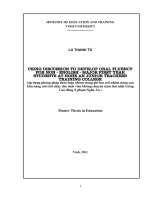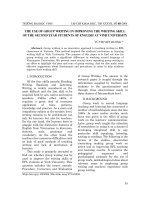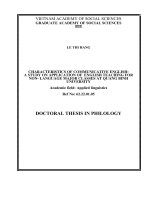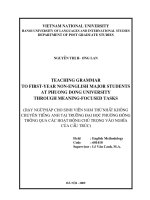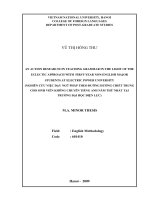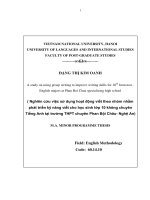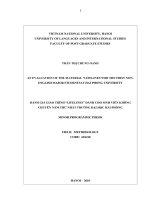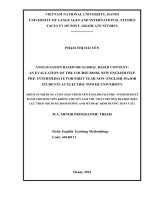How to improve writing skills for non english major freshmen at quang binh university
Bạn đang xem bản rút gọn của tài liệu. Xem và tải ngay bản đầy đủ của tài liệu tại đây (682.07 KB, 39 trang )
TABLE OF CONTENTS
ACKNOWLEDGEMENT
CHAPTER 1: INTRODUCTION
1.1. Rationale of the study ................................................................................3
1.2. Aims of the study .......................................................................................3
1.3. Research questions .....................................................................................3
1.4. Scope of the study ......................................................................................4
1.5. Design of the study ....................................................................................4
CHAPTER 2: LITERATURE REVIEW AND THEORETICAL
BACKGROUND .................................................................................................5
2.1. Prior studies related to the research ...........................................................5
2.2. Definition of writing skill............................................................................6
2.3. The importance of writing skill .................................................................7
2.4. Writing skill integrated with other language skills..................................... 9
2.5. The process approach to writing ..............................................................10
CHAPTER 3: METHODOLOGY
3.1. Partcipants ................................................................................................16
3.2. Questionnaire ...........................................................................................16
3.3. Procedures ................................................................................................17
3.4. Data analysis methods .............................................................................17
CHAPTER 4: FINDINGS AND DISCUSSION
4.1. Findings from questionnaires ...................................................................18
4.2. Discussions ...............................................................................................24
CHAPTER 5: RECOMMENDATIONS AND CONCLUSIONS
5.1. Summary ..................................................................................................26
5.2. Recommendations ....................................................................................27
5.3. Limitations of the study ...........................................................................27
QUESTIONNAIRES
REFERENCES
1
ACKNOWLEDGEMENT
During the process of completing scientific research report, I have
received warmly help from my supervisor, teachers and students of Quang Binh
University, family and friends.
First of all, I would like to show my deep gratitude to Ms. Pham Thi Ha,
Ph.D who directly guides me and give me useful advice and detailed comments
in the preparation as well as the correction. Besides, she always supported and
created favorable conditions for me to complete perfectly this report.
Secondly, I would like to send my sincere thanks to the headmaster of
Quang Binh University for giving a chance to talk and exchange idea with
teachers and students. I also send my special thanks to all teachers in Faculty of
Foreign Language for contributing their ideas and experiences to help me enrich
my report and limited knowledge in time of real survey at school.
Thirdly, I would like to express my deepest appreciation to my family
especially my parents who always take care of me and empowed me to complete
this report.
Lastly, I want to express my thanks to the students who were willing to
spend their time participating on the questionnaires. I also warmly thank to all
my friends for their directly help and encouragement with source materials in
writing process.
2
CHAPTER 1: INTRODUCTION
1.1.
Rationale of study
In communicative language learning, writing is one of the four basic
language skills, and it holds a major part of learning a language.
There are numerous reasons why students might need or want to improve
their writing skills in English. Perhaps students need to take an English language
exam, for example, TOEIC or IELTS. Maybe they need to write essays in
English, write letters to English friends or relatives. Besides, good writers are
more valuable in all areas of work. No matter where they work, they will need to
write. They might write reports, emails, or long presentations. The better their
writing skills, the more responsibility they will be given.
After completing their secondary and higher secondary level, most
students are not good at English, especially English writing skill. The abovementioned reasons are the motivation for doing the scientific research entitled,
“How to improve writing skills for Non - English major Freshmen at Quang
Binh University” with the aim of responding to the urgent need for improving
writing skills.
1.2.
Aims of the study
Within six months, this research focuses on non - English major
Freshmen at Quang Binh University. This research helps students improve their
writing skill with a good method. From the above reason, the specific aims of
the research are as follows:
(1) By the end of this study, non - English major Freshmen are conscious of the
importance of writing skills.
(2) This study aims to find out the writing problems of non - English major
Freshmen at Quang Binh University.
(3) The study is also intended to share some recommendations that Freshmen
can get to overcome those problems.
1.3.
Research questions
In order to achieve the research aim, the study was designed to find out
the answer to the following questions:
1. What is the attitude of students towards writing skills?
2. What are the obstacles that Freshmen have faced in learning writing skill?
3
1.4.
Scope of the study
The study focuses on improving writing skills for Non - English major
Freshmen at Quang Binh University. In fact, there are lots of various techniques
to study English written. It requires much of time and effort. However, due to
the limitation of time, resources and knowledge of mine as well as some other
conditions, this study was carried out to find out some techniques to help them
enhance their writing skills. Forty five non - English major Freshmen at Quang
Binh University were chosen as the main participants.
1.5. Design of the study
This study is divided into five chapters as follows:
Chapter 1: Introduction
In this chapter, the reseacher presents the rationale, aims of the study, the
research questions, the significance of the research, the scope of the study and
the organization of the researches.
Chapter 2: Literature review and theoretical background
This chapter states a theoretical background with two main parts. The first
part contains the prior studies related to the current research. The second is
about the theoretical background. It also includes the definition of writing skill,
the importance of writing skills, writing integrated with other language skills,
the process approach to writing.
Chapter 3: Methodology
This chapter describes the research methodology used so as to achieve the
objectives of the study. It includes a brief description of the basic type of the
research, participants in the study, data collection methods and data analysis.
Chapter 4: Findings and discussions
This chapter presents the findings and discussions for the study, the
difficulties in writing in English.
Chapter 5: Conclusions and recommendations
This chapter summarizes the main points and provides recommendations,
the limitations and suggestions for further research.
4
CHAPTER 2: LITERATURE REVIEW
This chapter states a theoretical background with five main parts. The first
part contains the prior studies related to the current research. The second is
about the definition of writing skill. The third is the importance of writing skills,
the fourth is writing integrated with other language skills, and finally is the
process approach to writing.
2.1. Prior studies related to the research
From the difficulties met by students in writing English, a number of
studies have investigated to find out strategies and enhance writing skills.
Lamberts (1999) put into practice a course to assist twelfth grade honors
English student’s writing skills through conferencing. The research consisted of
thirteen students who felt difficulties in writing. The objectives of the program
were to improve students’ abilities to write sentences that include transitions and
sentence variety, and to improve their attitudes toward writing. The researcher
uses Stanford Achievement Test to give students’ scores (pre-post test)
strategies mainly include shared learning, review conferences. These approaches
improved students’ writing skill effectively. This study is useful for the present
one as it gives a model of teacher student conference, which is helpful to the
current suggested program.
Stone, Ashbaugh & Warfield (2002) studied the effects of repeated
practice and contextual – writing experiences on college students’ writing skills.
The authous examined the effects of both general and task specific writing
experiences on the college students’ writing skill development. On the basis of
theories of expertise development and a cognitive process theory of writing skill
development the authors predicted that repeated practice would be associated
with superior writing skills and that after controlling for repeated practice
writing within a specific task domain would be associated with superior writing
skills. The results were consistent with the predictions.
Bassett et. al. (2001) in their study aimed at describing a course for
improving writing skills. The targeted sample students consisted of first and
third graders in two middle class communities in the southern suburbs of
Chicago. The need for improving writing skills was documented through
inspection, checklists, writing samples and surveys. The suggested strategies for
5
teaching writing skills were parents association, through newspapers and articles,
using writing centers, the make use of of e-mail, letter writing, free option of
topics, the sue of literature to read writing, author's chair, interactive journals or
notebooks, allowing inventive spelling, cross curricular writing and encouraging
at home writing. Findings showed an increase in the targeted students` writing
abilities, a positive attitude towards the writing process, an increased selfconfidence in the editing and revising of student work and increased parental
involvement in the area of writing.
Franco (2008) conducted a study titled ‘Using Wiki-Based PeerCorrection to Develop Writing Skills of Brazilian EFL Learners’. The research
was planned to investigate whether students' writing skill will be improved if
shared learning strategies are applied in wikis. Additional issues were examined,
such as, the level of motivation and the development of social skills.
It is obvious that there are many researchers conducting research on
writing skill and strategies to improve it. However, there is still no researchers
working on this issue with Non - English major Freshmen at Quang Binh
University. Therefore this is the reason why I conduct an investigation to find
out the difficulties that Non - English major Freshmen at Quang Binh University
who meet in learning writing. Besides, some useful recommendations and
strategies are hopefully given to minimize obstacles and hopefully the result
from this research will be a useful reference for further research.
2.2.
Definition of writing skill
Studying English as a foreign language cannot be separated from its
macro skills. Those are listening, speaking, reading, and writing. All of those
macro skills have their own difficulties to be mastered by the students. Richards
and Renandya (2002: 303) state that there is no doubt that writing is the most
difficult skill for students. Writing is one of the productive skills that involves
producing language rather than receiving language. Based on the Oxford
Advanced Learner’s Dictionary (Hornby, 1995: 1383), writing is the activity or
occupation of writing e.g. books, stories, or articles.
However, transferring the thought in the form of written text is not an
easy thing. Langan (2001: 10) describes that many people find it difficult to do
the intense, active thinking that clear writing demands; it is frightening to sit
down before a blank sheet of paper or a computer screen and know that an hour
later, nothing on it may be worth keeping; it is frustrating to discover how much
6
of a challenge; it is annoying to transfer thoughts and feelings from one’s head
into words; and it is upsetting to find that an apparently simple writing subject
often turns out to be complicated.
According to Hamp-Lyons (1990) in O’Malley, Michael, and Pierce
(1996: 136), writing is a personal act in which writers take ideas or prompts and
transform them into “self-initiated” topics. It can be concluded that there are
three elements in writing, i.e. ideas, transformation, and topics. In writing, the
writer should gather ideas first and then transform the ideas into a topic. Brown
(2001: 335) also states that writing is the nature of the composing process of
writing. He says that writing is a process which consists of thinking (collecting
ideas), drafting (writing), and revising (redrafting) that require specialized skills.
Writing does not only need some stages but it also has special conventions
related to grammar, vocabulary, letter, words, and text-formation that are
manifested by handwriting, spelling, layout and punctuation (Harmer, 2007:
323). Thus, to write well, the writer should pay attention to the conventions of
writing above.
In line with Hamp-Lyons and Brown, Sokolik (2003) in Linse and Nunan
(2006: 98) defines writing as a combination of process and product. Writing
needs both the process and the product. In other words, writing is done through
the process and resulted in a written product that is comprehensible to readers.
Langan (2001: 4) highlights the four basic principles that must be learnt
by the students to write effectively: start with a clearly started point; provide
logical, detailed support for the point; organize and connect the supporting
materials; the revise and edit so that the sentences are effective and error-free.
Those previous explanations describe the effective teaching and learning of
writing.
According to me, writing skill is specific abilities which help writers put
their thoughts into words in a meaningful form and to mentally interact the message.
Writing skills help students gain independence, comprehensibility, fluency and
creativity in writing.
2.3. The importance of writing skill
Writing skill is an important part of communication, students with good
writing abilities have an edge over the others. They generally score better than
the other students as they can effectively convey what they have learnt in the
written examination. Whichever course you pursue in college, the importance of
7
writing well cannot be undermined. For example, an engineering student should
have knowledge of technical writing as he/she may be required to write
technical documents - in college, while training and after joining a job. Similarly,
a student of science might be required to write research papers. For writing
research papers, it is necessary that you are able to put forth the right facts and
information. Also, the research paper should be free from spelling and grammar
errors. If you are not a good writer, you will not be able to accomplish this task
properly. Good writing skills are also required for getting a job, be it a summer
job, part-time job or a regular job after completing college. These days, the
employers look for good verbal and writing abilities in the candidates. Every
profession requires effective communication, and good-writing skill is necessary.
These are required for making presentations and reports and are handy for
communicating through e-mails.
In short, if your writing skills are not very good, then you must learn these
skills since that would prove very useful for your studies and future professions.
Writing is considered the most important language skill that students
require for their personal development and academic success (Mukulu et al.
2006). Similarly, Rao (2007) points out that writing strengthens students’
learning, thinkings and reflecting on the English language in their academics. In
addition, Ahmed (2010) notes that competence in writing helps students perform
well in their academic programmes. Moreover, being proficient in writing in
English will enable students to be professional and action researchers in the
future. However, it has been noted that learning to master writing skills is
aproblem students face at all levels of the education system. Ong’ondo (2001)
notes that writing skill is of major importance to students at all levels of the
education system. This is because most examinations and assignments learners
do at schools are mainly assessed through writing. It is probably because of this
crucial role in assessment that writing has been considered the most important
skill that students require for their academic advancement. This implies that
learners should be helped to acquire skills that will enable them to express their
ideas clearly and effectively in writing. Kroll (2003) notes that improving the
writing abilities of students has both academic and social implications. He
observes that helping students to write clearly, logically and coherently about
ideas, knowledge and views will expand their access to higher education and
give them an opportunity for advancement in the work force. He further
8
observes that the current trends of globalization and internet revolution have
come to require proficiency in English language that goes beyond the spoken
language embracing a variety of uses of the written language. Among such uses
include; writing of business letters, memos and telephone messages. This further
underscores the importance of learning writing skills. However, there has been a
considerable concern that majority of the students do not develop the
competence in writing they need to be successful in school, workplace, or their
personal lives (Graham and Perin, 2007).
2.4.
Writing integrated with other language skills
There are four basic language skills namely: listening, speaking, reading
and writing. Ouma (2005) observes that the development of the four language
skills is very important in every language classroom and that any inquiry into
writing endeavours among students presupposes effective understanding of the
other three skills.
Ikeguchi (1997) presented a lesson plan combining the teaching of writing
with reading, speaking and listening. The lesson was presented in three phases.
In the first phase students were allowed to choose any one topic that they were
most interested in, and something that they wanted to know more about. Then,
they were asked to look for a short passage from a magazine or a newspaper
article, and read thoroughly until they understood the content, and make a copy
to bring to class. The second phase was the interactive phase in which students
who had chosen the same topic were called to sit together and form agroup.
They were then asked to take turns in reading each of their articles to the group
members, while everybody else listened and then asked questions to clarify
points that were unclear. The third phase was the writing stage. Students were
asked to get back to their seats and write about the topic they had chosen to read.
The findings indicated that students were able to write freely and expressed
themselves meaningfully in writing by English.
A study by Ogalo (2011) examined teaching techniques that enhance
integration in the development of English language skills in secondary schools
in Gatundu district, Kenya. The findings of the study showed that teachers did
not integrate the four language skills. Respondents attributed the absence of
integration of the four language skills to the large class size and time. Listening
and speaking were rarely given attention. English language teachers used very
few activities in their teaching and lecture technique was the most commonly
9
used in teaching. It was recommended that for the integration in the
development of English language skills to be realized, teachers should use
techniques such as: group work, discussion, dialogue, debate, questions and
answer techniques. Teachers need also to use a variety of activities which
involve the students to participate such asgames, role-play, debate, and
discussions. It is with this perspective that the study sought to find out whether
teachers adopted the integrated approach to the teaching and learning of essay
writing skills.
Therefore, through previous researches, we can see that writing skill plays
an important part in language skills. It has an effect on the other language skills
and student’ s language learning.
2.5.
The process approach to writing
Recent approaches to writing have focused on the process rather than the
end product of writing (Kelly & Graham, 1998; Nunan, 1989; Leki, 1991). The
process approach was introduced in the mid-1960s. According to Rohman, in
this approach the writing is classified into three stages:
1) The pre-writing stage, that includes tasks that take place before writing.
2) The drafting and writing stage.
3) The re-writing stage, in which attention is paid to any grammatical,
punctuation or spelling mistakes (Rohman, 1965).
The process approach to writing also places more emphasis on writing
skills (planning, revising and drafting) than on linguistic knowledge (spelling,
grammar, punctuation and vocabulary) (Badger & White, 2000). Non - English
major Freshmen at Quang Binh University therefore have to be taught writing
through its process and stages such as planning, drafting, revising, editing and
publishing in order to write freely and arrive at a product of good quality.
2.5.1. Stages and activities of the process approach to writing
Williams (2005) also mentions that all students involved in writing need
to engage in the activities contained in the various stages of the process
approach: namely, pre-writing stage activities such as brainstorming, collecting
ideas, discussing; the drafting stage, and the revising and editing stages. In
addition, these activities can be used as many times as the writer needs (Tribble,
1996, 2003).
In the process approach, the teaching of writing has begun to move away
from a concentration on the written product to an emphasis on the process of
10
writing. All writers make decisions on how to begin and how to organize the
task. Therefore, they do not write on a given topic in a restricted time and hand
in the composition for the teacher to correct. The role of teachers, therefore, is as
education facilitators.
As described in Zanel (1993: 147) and Raimes (1985: 231), in the process
approach, the process of writing is seen as a recursive and complex process. In
other words, although there are identifiable stages in the process of writing,
writers can still revisit any of these stages many times before a text is completed.
The four stages of the process approach to writing are as following:
Pre-writing
(Specifying the task/planning and
outlining/collecting data/making notes)
↓
Composing/ Drafting
↓
Revising
(recognizing/shifting emphasis/focusing on
information and styles for your readership)
↓
Editing
(checking grammar/lexis/surface features:
such as punctuation, spelling, layout,
quotation conventions, references)
Figure 1. Stages of the process approach to writing
Since it lays the emphasis on the writers’ writing process, the process
approach has been widely accepted. The focus on the writer inherent in the
development of process approach has brought a range of benefits to teachers and
students. ̣(Tribble, 1996: 40)
a) Pre-writing
11
A significant feature of the process approach to writing is that students
collect and produce ideas before finishing the actual writing (Zamel, 1982).
According to Hewings and Curry (2003), brainstorming and student discussions
are helpful strategies that may be used to collect and gather ideas effectively.
During the pre-writing stage students can use various methods, such as
brainstorming, word clustering and free writing, as a way of discovering
themselves and their ideas (Elbow, 1973). Brainstorming means thinking
quickly in order to produce and collect ideas for a specific topic or problem; it
should therefore be done freely without any structure or judgment, and
collaborative learning is the best way of ensuring that it is carried out effectively
(White & Arndt, 1991). Planning a topic is another important strategy of the prewriting stage that helps learners to organize and write successfully (Peacock,
1986). According to Flower and Hayes (1981), planning is a mental strategy, so
students may return to it at any time during the writing process.
Another technique of the pre-writing stage is writing and making notes in
order to collect, generate and organize ideas. Ideas are generated in a free and
unstructured way and without being organized. Organizing ideas is a structuring
strategy that could be carried out through selecting appropriate names as
headings and categories (White & Arndt, 1991). Making an outline during the
pre-writing stage is another useful strategy. According to Williams (2003),
writers may find it necessary and useful to write down their important ideas in
outline form, starting with small ideas and moving to more general ones.
b) Composing / Drafting
Getting started in writing an essay is one of the difficult stages in the
process approach to writing, because it requires a great deal of attention,
application and focus (Harris, 1993; Hedge, 2000). The drafting stage comes
after the completion of pre-writing activities such as specifying the writing topic,
collecting data and making an outline (Williams, 2003; King & Chapman, 2003;
Tribble, 1996, 2003). During drafting students should keep writing their essay
from beginning to end without stopping (Gebhard, 2000). According to King
and Chapman (2003), during this stage writers should focus on the actual
writing and leave checking both grammatical and spelling mistakes to the final
stages.
c) Revising
12
Hedge (1988) mentions that ‘good writers tend to concentrate on getting
the content right first and leave details like correcting spelling, punctuation and
grammar until later’ (p. 23). The main concern of the revising stage is to
complete the content correctly, whereas correcting grammatical and spelling
mistakes can be done during the editing stage (Tribble, 2003). Focusing on
reorganizing sentences and adding more appropriate vocabulary are essential
aspects of the process approach to writing (Williams, 2003). In the revising
stage writers should carry out activities such as deleting unnecessary sentences
and moving certain words or paragraphs forward or backward (Zamel, 1981;
Williams, 2003; Hedge, 2000).
d) Editing
The last stage of the process approach to writing is editing. This stage
concentrates on linguistic accuracy: grammar, spelling and punctuation (Harris,
1993). Hewings and Curry (2003) state that the editing stage involves checking
references and formatting the student’s writing. In this stage students may
employ various strategies to correct their mistakes, such as working in pairs or
in groups, and use any available resourses such as textbooks, dictionaries and
computers (King & Chapman, 2003; Hewings & Curry, 2003).
Moreover, according to Graham Stanley (2007:16), there are many ways of
approaching process writing as was stated above, it can be broken down into
three stages:
Pre-writing
The teacher needs to be stimulate students’ creativity to get them thinking
how to approach a writing topic. In this stage, the most important thing is the
flow of ideas and it is not always necessary that students actually produce much
(is any) written work. If they do, the the teacher can contribute with advice on
how to improve their initial ideas.
Focusing ideas
During this stage, students write without much attention to the accuracy
of their work or the organization. The most important feature is meaning. Here,
the teacher (or other students) should concentrate on the content of the writing.
He or she can raise the questions “Is is coherent? Is there anything missing?
Anything extra?”
Evaluating, structuring and editing
13
Now the writing is adapted to a readership. Students should focus more on
form and on producting a finished piece of work. The teacher can help with
error correction and give organizational advice.
In conclusion, however, writing is a complex and can lead to learner
frustration. As with speaking, it is necessary to provide a supportive
environment for the students and be patient. This approach also states that more
time be spent on writing in class, but not all classroom time is spent actually
writing. Students may also react negatively to reworking the same materials, but
as long as the activities are varied and objectives clear, they will usually accept
doing so. In the long term, teachers and students will start to recognize the value
of a process writing approach as their written work improves (Stanley, 2007: 9).
2.5.2. Studies related to the process approach to writing
Various studies and researchers have examined the process approach to
writing in different situations in order to show the advantages and benefits of
this approach.
Using the process approach to writing plays a role in changing the
attitudes and opinions of students. Belinda (2006) implemented six writing
programmes on process writing in six primary classrooms in Hong Kong, three
in the upper primary levels and three in the lower levels. She investigated the
effectiveness of these processes on changing students’ writing and attitudes by
comparing all six classrooms with each other and the upper and lower levels in
general. These comparisons were between pre and post-tests of questionnaires,
interviews and observations. The study purpose was to improve students’
writing strategies in all stages of the process approach, including pre-writing,
drafting and revising. Because children at primary levels are interested in
reading, they were taught how to write a story through processes and stages.
This type of writing was used for both pre- and post-tests. The researcher
noticed that the process approach to writing had been found to be a useful and
helpful strategy; however, it could be more effective for students fluent in
English in strengthening their writing skills.
A few researchers have compared the effectiveness of self-assessment in
students’ process-based writing that used in product-based writing. El-Koumy
(2004) compared ESL students adopting the process approach to writing with
other students using a product approach. The sample was 80 male Arab students
divided into two classes. The students were studying at a general secondary
14
school in Menoufya in Egypt. The students in both process and product groups
were given a pre-test and a post-test to enable the researchers to assess the
difference between the two groups in terms of self-assessment. In the pre-test
the students were asked about the role of TV in our lives, whereas the post-test
was about the impact of computers on our lives. The results showed that the
process group produced a greater quantity of writing than the product group,
whereas the product group was better than the process group in terms of the
quality of writing. El-Koumy found that self-assessment of the process of
writing encouraged students to develop their thinking skills and writing
strategies, so they became able to discover and elaborate their ideas effectively.
In summary, the chapter so far has presented the relevant literature
including the process approach to writing and the analysis of some cases on
learning the skill in Viet Nam as well as in some other countries. In general,
though it still bears some limitations, process approach has made a great
improvement in wrting.
15
CHAPTER 3: METHODOLOGY
This chapter deals with the procedures and methods that were used to
collect and analyze data. It describes the research design, location of the study,
validity and reliability of the research instruments as well as data collection
procedures, data analysis and finally logistical and ethical considerations.
3.1.
Participants
The research was carried out in three classes, all the participants in this
study are Non - English major Freshmen from the different departments of
Quang Binh University. The first class that the research focuses on is fifteen
freshmen from the class University of Accounting course 59, the second class is
fifteen freshmen from the class University of Pedagogy course 59, and finally is
fifteen freshmen who are studying level of English A2. Their mother tongue is
Vietnamese and they are studying English as a foreign language. In order to get
information, I gave them my questionnaires.
3.2.
Questionnaire
Questionnaire was used as data collecting instrument. A questionnaires
defined by Forcese and Richer (1973) is a form of securing answers to questions.
They further explain that they are forms which the respondent fills in by
himself/herself. A survey method uses questionnaires as data collecting
instruments. Questionnaires elicit good data and save time and they have the
ability toreach a number of respondents (Forcese and Richer, 1973:85). For this
study, to avoid the negative features of questionnaires, written questionnaires are
designed so carefully so as to avoid misunderstanding and inconvenience to the
respondents.
The questionnaire for students consists of two parts; the first part is to get
general information about the respondents. The second part includes 14
questions in which there are 7 multiple choice questions, 5 yes-no questions and
2 open-ended questions. The questionnaire was delivered to forty-five freshmen.
Each student completed andreturned the questionnaire. While filling up the
questionnaire, students were asked that writing their name was not mandatory, it
is optional. The questions in the questionnaire were set to obtain information
about their attitude, problems, opinions and motivations as a non-major English
student. These questions were designed together information about the problems
which they are facing while writing and their way of dealing with them.The
16
result of the survey conducted among the participants was counted into
percentage. From the responses of the participants the researcher finds out the
reasons of their writing problems. Especially, all the questions were written in
Vietnamese to assure that they are able to understand the questions and have
their full expressions of idea.
3.3.
Procedures
To gather data for the research questionnaires were designed. The
questionnaires were conducted to find out the methods to enhance writing skill
for Non - English major Freshmen at Quang Binh University. As the
questionnaires were delivered to the participants, the researcher asked them to
give the feedback if they met any troubles. For example, if freshmen did not
understand any questions, they could ask me - the researcher. The questionnaires
were distributed to all the participents at the beginning of the first week of
January 2018.
3.4.
Data analysis methods
When the data were collected, they are carefully examined by the
researchers. The data obtained from questionnaire were analyzed according to
statistical frequency and converted into percentages. Afterwards, it was
presented in figures and tables
The questionnaires will code for different types of comments including
difficulties and methods in improving writing skill. The analysis of the
questionnaire data will help the researchers get the valuable assessment on
enhancing writing skill of Non – English major freshmen at Quang Binh
University
In short, with the combination of this methods through forty-five
questionnaires from English non-major freshmen at Quang Binh University, the
researchers had a careful plan to collect and analyze the data accurately so that
the research results can be reliable.
17
CHAPTER 4: FINDINGS AND DISCUSSION
In this chapter, the results derived from the analysis of the data collected
from two questionnaires are displayed. They are used to answer two research
questions:
1. What are the students’ attitude towards writing in English?
2. What are the obstacles that Freshmen have faced in learning writing skill?
4.1. Findings from questionnaire
In this section, the researcher will analyze and discuss the result of the
study in details basing on the information collection from the data collection
instruments. According to results which were collected from questionnaires, the
researcher will try to find out students’ problems in writing skill and the causes
of those problems as well as survey how students learn writing skill.
4.1.1. The student’s attitude towards writing in English
Answer
Questions
Number of Percentage
Type
students
(%)
Can you write an essay with any topics
easily?
Yes
0
0
No
45
100
Do you feel confident in your ability to
Yes
3
7
express your ideas in writing?
No
42
94
Do you like the way in which you are taught
to improve your English writing skills?
Yes
30
67
No
15
33
Do you like the English language courses for
Yes
40
89
developing your writing skills?
No
5
11
Do you have goals to improve your writing
skills in the future?
Yes
43
95
No
2
5
Figure 2. The student’s feeling towards writing in English
Figure 2 shows the questionnaire administered to the students and the
number of respondents per each degree of response. Students do not feel
confident to express their ideas in writing (94%); they cannot write on any
topics easily (100%); however, they like the courses in which they are taught
writing English (67%); Nonetheless, some students reveal that they like the
English language courses for developing their skill (89%). Besides, most
students have goals to improve their writing skills in the future (95%), they
18
answered that they would learn to enrich their vocabulary, grammar, usually
pratice their writing skills more.
On the other hand, nobody can write easily on any topics easily (0%). A
few students do not like the way in which they are taught writing English (33%).
The minority reveals that they do feel confident to express their ideas in writing
(7%); Some students do not like the English language courses for developing
their skill (11%). Furthermore, a few students do not have goals to improve their
writing skills in the future (5%) because they thought that English is not
necessary for their life, their jobs.
Figure 3. The student’s attitude towards writing in English
According to figure 3, a small number of students like to learn writing
skill. Only 5% of them are extremely interested in writing. This indicates that
writing is not a favorite subject to most of students. Observing two periods of
writing, researcher recognized that not many students took part in writing tasks
actively. It can be inferred that students’ attention to writing skill will be less
than the others.
19
Figure 4. The students’ satisfaction with their writing
According to figure 4, many students (60%) think that they are not
satisfied with their English writing skills, 7% students are satisfied English
writing skills. It indicates that they are not good at writing in English.
Questionnaire 14 is an open-ended questions which mentioned that
students’ attitude to homework of writing. According to their answer, most
students study hard. Students do all the exercise in textbook, those given by the
teacher and prepare for new lesson. Besides, students do homework carefully
and do some more similar exercises. However, students only do some exercise
when self study at home and some students try to do some homework. This
expresses that students only do exercises to please their teachers; even some of
them ignore finishing homework. This can prevent students from writing well
because of students’ preparation before and after classes are two stages which
can notably support students inside classroom. But students do not carry out
them well. This is also shown when the researcher attends a writing class. As
students are asked to write in groups and present their writing; some students’
writing reflect the lack of writing practice. They write very short sentences, and
their writing is the rough combination of facts which contain many simple
mistakes.
4.1.2. Student’s preparation to study writing
20
How much time do you spend on self study writing at home?
70
60
50
40
30
20
10
0
Write to 30 minutes
Over 30 minutes to
over one hours a day
Over one hour a day Not self study at home
Figure 5. Amount of time students spend on writing a day
The results from figure 5 show that many students have care for learning
writing skill, because 31% students self study writing skill 30 minutes a day and
9% students spend over 30 minutes to over one hour a day for studying writing
at home. In contrast, many students only spend a little time for self study at
home. This can affect to students’ ability when writing a paragraph or sentence.
Self study at home plays an important role because it prepares students
knowledge before coming to classroom, and then helps students review what
they learned. However, 58 % students do not carry out them well. There are two
main reasons to explain for this problem. First, students have to study other
subjects and they have to do housework. Second, maybe students are not
interested in learning writing skill. Not practicing writing skill regularly maybe
the cause of poor grammar, limited vocabulary and inability to write of some
students.
21
Figure 6. Things students do before starting to write
Based on figure 6, 15% students list and choose the main ideas, 5%
students discuss with friends while 7% students even do nothing, just write
naturally. If students do nothing before writing, they maybe write disorderly,
employ grammar sloppily, and even have nothing to write. 73% students get
information from Internet or books; it can help them get a lot of useful
information to support for their writing.
Figure 7. Materials that students often use
22
Basing on figure 7, a lot of students (47%) use vocabulary or grammar
books for practicing writing skill. There are 17% of students using books with
sample works effectively. Maybe the time of writing inside classroom is not
much, and teacher cannot solve all of the exercises. In this case, books for
writing are supporting tools which can help students consolidate what they have
not mastered in classroom. However, 36% students do not have any books for
writing, except for textbook. This also means that students do not carried out
well works such as enlarging the knowledge of grammar, imitating writing
styles and learning to use right words in context of writing from the textbook. It
seems impossible that students can improve their writing skill. This is also the
reason why students have difficulties with vocabulary and grammar in writing
4.1.3. The important things to improve writing skill
What factors are needed for non - English major
Count
Rate %
A, Writers’ motivation
8
17
B, Background knowledge
30
67
C, Teaching methods
7
16
D, Other ideas
0
0
Freshmen to develop their writing skills?
Table 1. Factors needed by students to develop their writing skill
What should you do to improve your writing skills?
Count
Rate %
A, Should practice writing English at school and at home
22
49
B, Should use more strategies in writing
5
11
C, Should enrich your vocabulary
17
38
1
2
D, Others:
Improve grammar about tenses
Read more materials that help to improve writing in
English
Table 2. Things need to improve
According to table 1, students think that the most important factor are
needed for non - English major Freshmen to develop their writing skills is
background knowledge (67%) because in writing vocabulary and grammar are
23
extremely importance. So in the table 2, students should enrich their vocabulary
(38%). Besides, to enhance students’s writing skills, students must to improve
grammar or read more materials that help they to improve their writing in
English.
4.1.4. Diffculities in learning writing skill
In questionnaires, question 13 mentioned about difficulities that students
often meet when studying writing skills. The most difficult problem that many
students have is limitation of vocabulary. This problem prevents students from
improving their writing competence. In the process of observation, the
researcher realizes that students are introduced a lot of vocabulary before
writing, they still do not have enough vocabulary to write, they continually ask
teachers about vocabulary and make a lot of mistakes of vocabulary when
writing. There are many reasons leading to this problem. Firstly, many students
spend a little time for self studying writing skill at home, some of them even do
not self study at home. Secondly, students do not know ways to study
vocabulary effectively. Students often learn vocabulary just by focusing on
English meaning. These explain that the ways students learn vocabulary are not
really effective, and this may be the main cause of students’ poor stock of
vocabulary.
Another problem students often have in learning writing is related to
grammar. Students found it hard when encountering with the lesson that has
many complicating grammar points. Otherwise, two important things make
students difficult to learn include the lack of ideas and topic inappropriateness.
In addition, students think that the lack of materials for consulting and the
limited help from teachers are the most difficult problems in their writing
something. The reasons for these problems are that students do not approach
necessary material for writing; spend little time for studying writing as well as
not being interest in it. These reasons explain for getting low result in studying
writing skill in most of students.
4.2. Discussions
Problems that the students often have in learning writing skill:
Problem 1: The most serious problem that students often have is the lack of
vocabulary. The researcher concludes that lack of vocabulary is the biggest
problem that most students usually have when they study writing skill. This
24
affects students’ study result and generates many difficulties in studying writing
skill. Vocabulary limitation also affects the learning’s results of other skills.
Problem 2: Students have not focused on learning grammar. Through passing
questionnaires, the second problem is that students have difficulties in studying
grammar. Besides vocabulary, grammar plays an important role in English as
well as studying English. Most of students often have mistakes about grammar
when writing a passage. This clearly expressed in the analysis on the students’
writing papers above. Grammar limitation also affects the ability of using
language in most of the students.
Problem 3: Students lack material sources to improve their writing skill. One of
the problems students usually have when studying English is lack of materials.
This will influence the learning’s result of students. In some cases, when
teachers do not have time for teaching students ways of writing effectively,
students can consult more on advanced books or other essential materials. This
leads to problem that many students have difficulties in ordering ideas in writing
or lack of grammar knowledge.
In my opinion, beside three main problems above, students also lack time
for learning writing skill. At the moment, the time for learning English is little
and it cannot afford the demanding. Furthermore, the topics of writing lesson in
textbook are difficult for students to do. I realizes that students have difficulties
when dealing with the topics of writing lesson in textbook. In fact, many topics
require students a large source of vocabulary. For example, students are asked to
write a paragraph to describe the population in formation in the chart, or write a
description about one of the popular celebrations in Viet Nam. These topics
seem difficult for students to write about.
25
